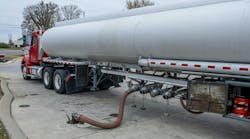Despite often heated rhetoric around the subject, many Americans believe the North American Free Trade Agreement (NAFTA) helped support strong economic growth in the U.S. over the last two decades, according to a new poll, while withdrawing from the deal would result in negative consequences for them.
In a recent survey commissioned by customer brokerage firm Livingston International Inc. and conducted online by the Harris Poll among more than 2,000 U.S. adults ages 18 and older, 4%% believe the trade deal “greatly influenced growth” in the U.S. economy over the past 20 years, while 57% believe a withdrawal from NAFTA would likely result in price increases on everyday goods.
Only 6% of those polled believe the U.S. should withdraw from the agreement altogether, noted Daniel McHugh, Livingston’s CEO, said in a statement.
"[That] recent data suggest Americans hold a measured view of NAFTA and would like to see the government take a balanced and sensible approach in the NAFTA negotiations," he added. "Americans recognize and understand that NAFTA has resulted in a variety of effects on the U.S. economy, most of which have been positive, and withdrawing from the agreement will likely lead to unwanted and unnecessary economic disruption."
In terms of job losses, only 42% of those polled blame NAFTA as the “primary cause” of American manufacturing jobs to workers in other countries, while 62% see it as just one of many factors contributing to the loss of those jobs.
On top of that, 56% of Americans and 50% of “unemployed” Americans (defined as those who are not currently employed full-time, part-time or self-employed) agreed in the poll that “technological advancements,” such as robotics and automation, played a greater role than NAFTA in the loss of American manufacturing jobs.
Even in the Midwest and Northeast, the areas most affected by manufacturing job loss, Harris Poll’s survey found 65% and 58%, respectively, believe NAFTA is just one of many factors contributing to the loss of those jobs, while 56% in the Midwest and 55% in the Northeast said productivity-enhancing technologies played a bigger role than NAFTA with respect to those job losses.
Some of the other findings from this survey include:
- 43% believe NAFTA has contributed to the growth of America's “knowledge economy,” e.g., professional services, engineering, information technology, etc.
- Close to one in five Americans (17%) believes the U.S. should neither renegotiate nor withdraw from NAFTA because it is already an effective agreement or because doing so will harm key industries.
- About one in five Americans (19%) believes the U.S. made the right decision to renegotiate NAFTA because the agreement needs to be modernized.
- Only about one in 10 Americans (13%) believes the U.S. made the right decision to renegotiate NAFTA because the trade deal is unfair to America; and only six percent believe the U.S. should withdraw from the agreement.
"In many ways, these sentiments echo much of the feedback industry groups have already provided to the Office of the United States Trade Representative, namely that there is an opportunity to update or modernize NAFTA, but that there should not be a complete withdrawal or any extensive modification of the agreement that could dramatically disrupt business operations," noted McHugh.
"With 14 million U.S. jobs dependent on trade with Mexico and Canada, alterations to NAFTA such as changing the rules of origin for manufactured goods could adversely affect employment and lead to the price of everyday goods going up," he stressed.



